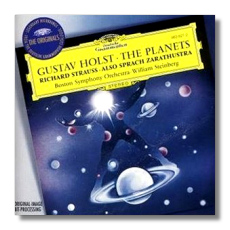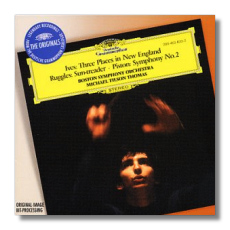
The Internet's Premier Classical Music Source
Related Links
- Latest Reviews
- More Reviews
-
By Composer
-
Collections
DVD & Blu-ray
Books
Concert Reviews
Articles/Interviews
Software
Audio
Search Amazon
Recommended Links
Site News
 CD Review
CD Review
Deutsche Grammophon

The Originals
- Gustav Holst: The Planets
- Richard Strauss: Also sprach Zarathustra
Boston Symphony Orchestra/William Steinberg
Deutsche Grammophon 463627-2 ADD 76:03


- Charles Ives: Three Places in New England
- Carl Ruggles: Sun-treader
- Walter Piston: Symphony #2
Boston Symphony Orchestra/Michael Tilson Thomas
Deutsche Grammophon 463633-2 ADD 61:48
William Steinberg's tenure with the Boston Symphony Orchestra was brief, and it was plagued by ill health. His star was setting. The star of his young designated assistant, Michael Tilson Thomas, was definitely on the rise. It was a clever idea of Deutsche Grammophon to release these two discs at the same time in their ongoing "Originals" series.
The Planets and Also sprach Zarathustra make an interesting combination because both are metaphysical works, yet the Holst is popular and the Strauss is bookish. Steinberg's blistering readings, recorded in 1970-71, allow them to appear on a single CD. There's no trace of the conductor's health problems here. Among British writers, Steinberg's "Mars, the Bringer of War" usually gets hit for being too fast to suggest the brute foolishness of war, but in truth, the unusually brisk tempo is effective in its own right. "Jupiter, the Bringer of Jollity," is another highlight, with English gravitas traded in for a more universal brotherhood. The women of the New England Conservatory Chorus score a major triumph of their own in "Neptune, the Mystic." Never have the wordless vocal lines been so ethereal and beautifully impersonal; it is like listening to a synthesizer, and I intend that as a compliment. In the Strauss, Steinberg is unfailingly muscular, and he has little patience for Strauss's pretensions, which perhaps is all for the best. The Bostonians play gloriously (as they do in the Holst), and this recording of Also sprach Zarathustra is first-class in every way, including the engineering.
Tilson Thomas's collection of tough and untamed Americana was recorded in 1970 and released on two separate LPs. (The missing item here is the Piston's disc-mate, the Schuman Violin Concerto, for which Paul Zukofsky was the soloist.) The x-ray clarity of the sound (a combination of the engineering, Boston's Symphony Hall, and the Orchestra itself) helps the Piston and the Ruggles, but perhaps hinders the Ives, which sounds better with more impressionist chiaroscuro. The bleeding colors of "The Housatonic at Stockbridge" are too graspable here. On the other hand, it is uncanny how Tilson Thomas untangles the strands of "Putnam's Camp," which turns any conductor into a many-armed Shiva of the podium. In the Ives, I prefer Ormandy (whose recording is available at a budget price.) In the other two works, though, Tilson Thomas is unsurpassed. Piston's masterful Second Symphony was written in 1943, and it reflects that year's equivocal yet essentially positive American spirit. The middle movement is intensely moving, and the short Allegro finale is optimistic without being stupidly patriotic. Ruggles's iconoclastic Sun-treader (the title comes from poet Robert Browning) is a difficult work, but one whose forbidding exterior still has the power to attract, thanks to the composer's unmistakable sincerity, as well as his intellect. A comparison between Ruggles and Webern is not unthinkable: both tirelessly polished their uncompromising little creations until their spines were as clean and sharp as the points of newly-cut diamonds. It says a lot in favor of Tilson Thomas that this was the face of American music that he wished to present, not Gershwin or Copland. Thirty-one years later, he and the Bostonians have yet to be outdone.
Copyright © 2001, Raymond Tuttle


















